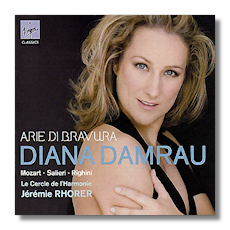
The Internet's Premier Classical Music Source
Related Links
-
Mozart Reviews
Salieri Reviews - Latest Reviews
- More Reviews
-
By Composer
-
Collections
DVD & Blu-ray
Books
Concert Reviews
Articles/Interviews
Software
Audio
Search Amazon
Recommended Links
Site News
 CD Review
CD Review
Arie di bravura

- Wolfgang Mozart:
- Die Zauberflöte: O zittre nicht; Der Hölle Rache
- Lucia Silla: In un instante … Parto, m'affretto
- Basta, vincesti … Ah, non lasciarmi (Concert aria)
- Vincenzo Righini: Il natal d'Apollo: Ove son? Qual'aure io spiro; Ombra dolente
- Antonio Salieri:
- Cublai, gran Khan die Tartari: Fra i barbari sospetti; D'un insultante orgoglio
- L'Europa riconosciuta: Numi, respiro … Ah, lo sento; Quando più irato freme
- Der Rauchfangkehrer: Basta, vincesti … Ah, non lasciarmi
- Semiramide: Sento l'amica speme
- La finta scema: Se spiegar potessi appieno
Diana Damrau, soprano
Le Cercle de l'Harmonie/Jérémie Rhorer
Virgin Classics 3-95250-2 DDD 67:36
This is Damrau's debut recording for Virgin Classics, and it deserves to sell well. The repertoire is both unusual and attractive – Cecilia Bartoli is having an effect on people's tastes! Furthermore, Damrau has a brilliant voice, very much in the manner of some of the German coloraturas from eras now past, and she uses it intelligently.
Do we need to debate the relative merits of Mozart and Salieri? Fortunately, we no longer feel compelled to demonize the latter composer, as sometimes happened during the popularity of Peter Shaffer's Amadeus – first the play and then the film. Salieri was no second-rate composer, and thanks to recent CDs by Bartoli and now by Damrau, we can begin to appreciate just how much he has to offer. As for Vincenzo Righini, he was a contemporary of both composers, and quite successful during his lifetime too. (He turned the Don Juan story into an opera several years before Mozart.) Il natal d'Apollo (The Birth of Apollo) is a scenic oratorio, and the two arias presented here are not inferior to Salieri.
German by birth, Damrau studied in Würzburg and Salzburg and broke onto the international scene in 2004 with a performance of Salieri's L'Europa riconosciuta at La Scala. Her signature role has been the Queen of the Night from Mozart's The Magic Flute. Beyond Mozart, she has made her mark as Rosina in Rossini's The Barber of Seville, and has performed many other coloratura roles, as well as roles in the lyric soprano repertoire. This season (2007-08), she is appearing both as Pamina and the Queen of the Night in the Met's production of The Magic Flute … although not on the same nights, obviously!
This CD, as its name suggests, emphasizes Damrau's coloratura skills, as well as her stylish approach to music of the Classical era. Lest one think that Mozart cornered the market on stratospheric pyrotechnics in "Der Hölle Rache," Damrau presents "Ah, lo sento" from L'Europa riconosciuto, the Salieri opera that created a small sensation at La Scala, and did much to push Ms. Damrau's career forward. Salieri puts the singer through her paces in this aria, and Damrau doesn't flinch, although she doesn't sound as secure here as she does in Mozart's showpiece. Actually, if you really want to hear – and see – Damrau nail this music and make it come to life, there is a video on YouTube of one of Damrau's La Scala performances, and it is really something. Unfortunately, it makes you realize that the recording under review doesn't have the same electricity. Part of the problem might be that Rhorer and his band of period instruments don't have the strength of Riccardo Muti and the orchestra of La Scala. Rhorer, like many period instrument leaders, has a tendency to go a little overboard with fast tempos, too, which makes the music seem fluffier than it is.
So, if not everything on this CD has the personality one might like it to have, I don't think Damrau is entirely to blame, although no doubt she, like most singers, is at her best when she is in front of an audience. Get this CD for the voice itself, then, and for the opportunity to hear some really good music that is off the beaten path.
Copyright © 2008, Raymond Tuttle




















